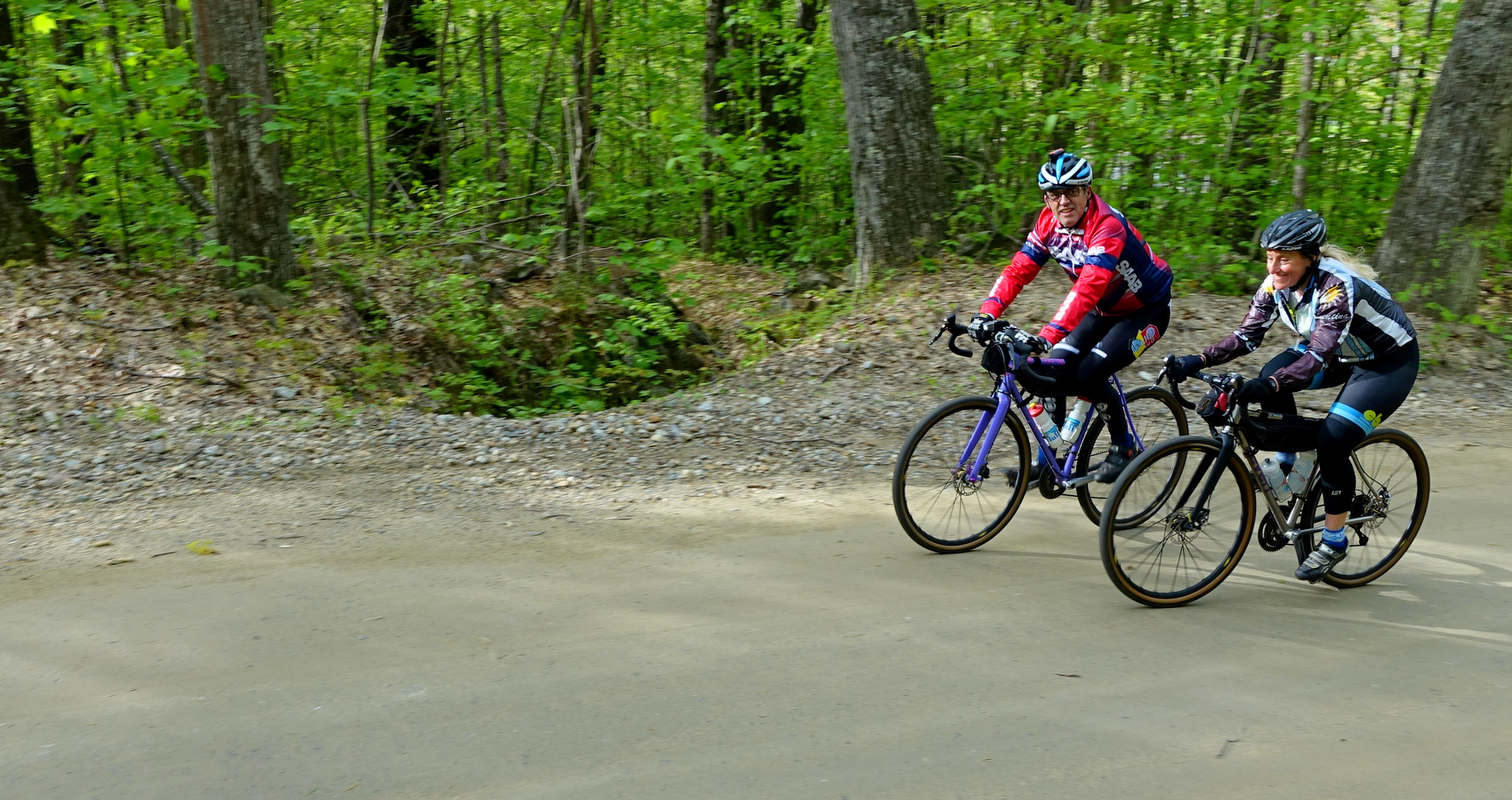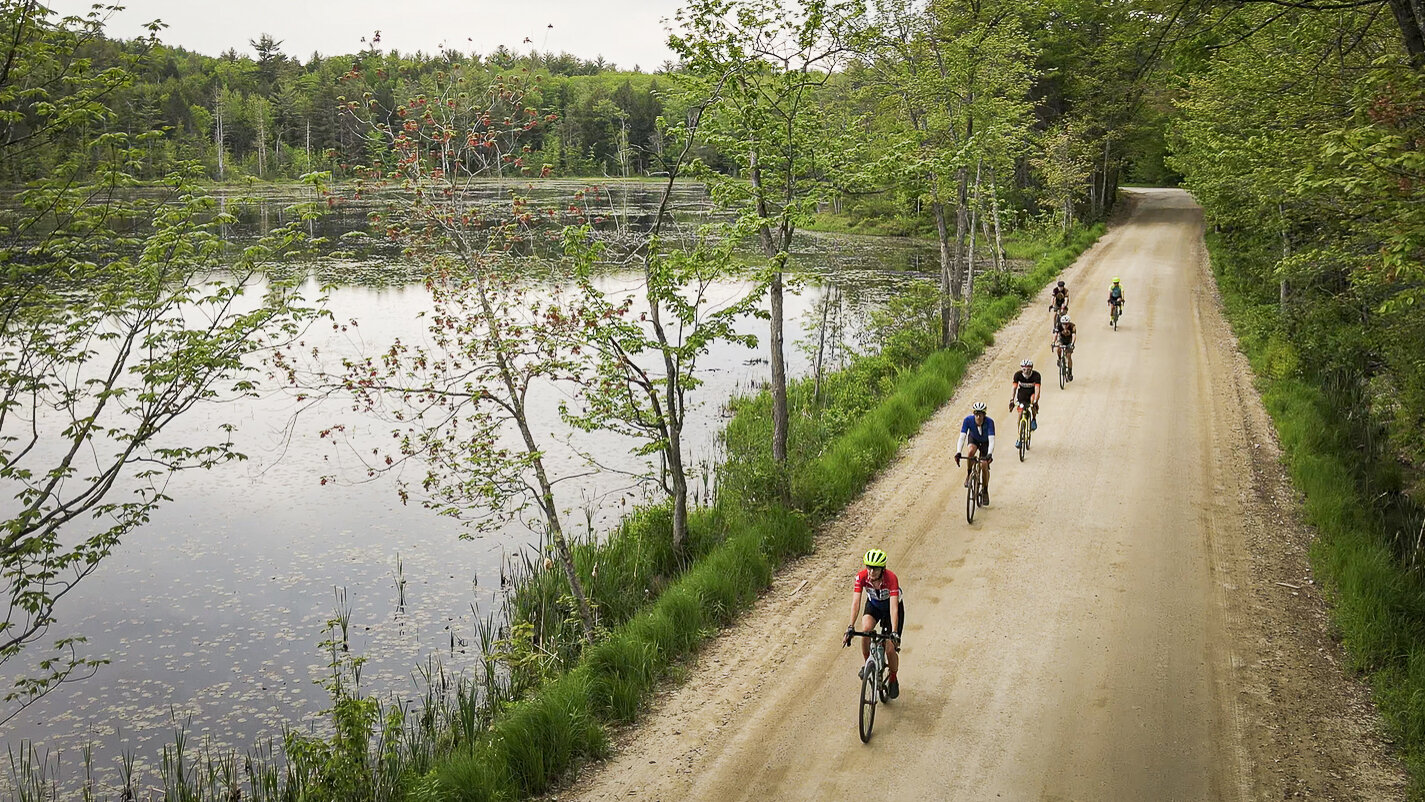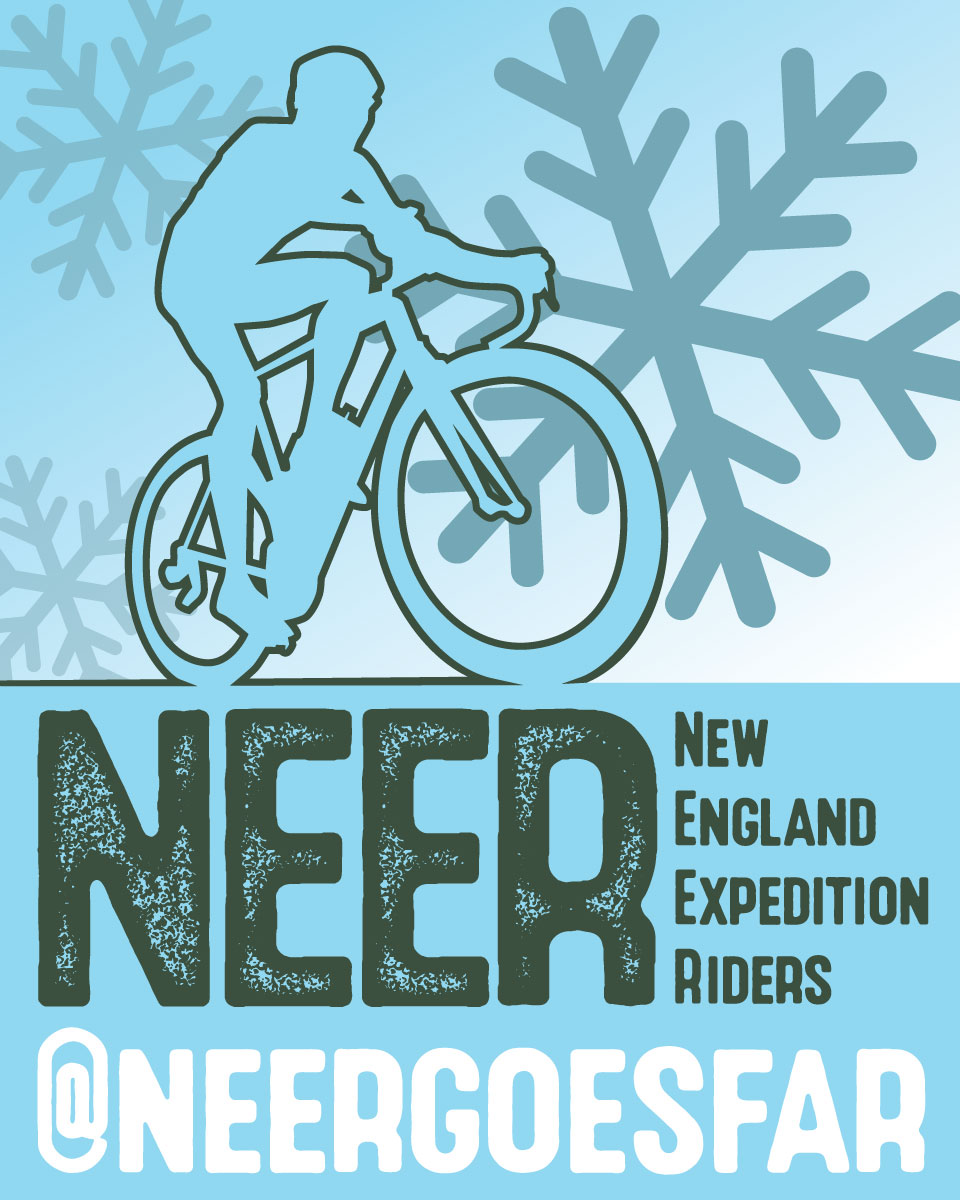Ride Type: Mixed Terrain Ride / Roads and snow-covered trails - over 80% of the ride is on dirt trails
Location: Cambridge, near the Alewife Station
Date & Time: Right after the first “official” snow hits!
Distance: ~10 miles, approx 2 hrs, condition-dependent
Price: Free, but you must be a NEER Member to attend
Please RSVP in the form below if you hope to join in on this ride. We’ll ask for a more definite RSVP once the “go time” becomes clearer
In 2017, we had a huge turnout for the first snow ride which hit early in the afternoon on a Saturday!
Important Ride Updates
Details: When the first snow comes to eastern Massachusetts, we ride in it regardless of the time of day or day of the week. This is our 8th year hosting this memorable and much-too-fun ride!
If the first snow happens between January 3 & January 9, we will not be able to run this ride since we’ll be in Idaho to participate in the Fat Pursuit. If this happens, we’ll host an extra special snow ride to make it up to you!
Starting/ending Location: The ride will begin at 125 Cambridgepark Dr, Cambridge, MA 02140, this is the parking lot next to Revival Cafe, very near the Alewife station.
Route: The route is available to attendees 15-minutes prior to roll-out. We will email it to those who have registered if time permits. We’ll have at least one ride leader, possibly more, who will lead the way so it is not required for you to come with the route loaded.
Estimated time: ~2 hours
RSVP: Please RSVP below (at the very bottom of this page) so we know if you’re interested in this ride.
Required: Studded tires and lights. New snow falling on the frozen ground will turn to ice. Front and rear lights are required anytime we’re riding in hard-to-see conditions which includes falling snow and/or night.
Ride Notes: The pace is based on conditions. We don't ride too slowly because we'd get cold, we don't ride too fast because that wouldn't be safe with the snow. We will ride spaced out with a leader or two. Be sure to come prepared with the right bike & tires, and proper attire for the conditions and temperature.
The pace assumes riders who attend have adequate fitness to keep up on a 16mph road ride, if riders were on road bikes on a road ride. This is not that kind of a ride, of course, but that is the best way to describe the amount of fitness necessary to ensure you’ll have a good time.
Read on below, there is a lot to this ride and how it works. Be sure to understand it to be able to participate in it! KEEP READING - lots more information is further down this page.
Last Minute Information: Watch NEER’s Twitter feed for last-minute updates, especially considering this is a last-minute ride by its very nature.
Contact Information: Email - connect@rideheadquarters.com, Phone - (413)-461-7433 - we receive voicemails left at this phone number regardless of where we are.
Riding Rules
Everyone who chooses to participate in this ride must be comfortable with the protocols.
All of our Riding Rules apply. Read and digest them before the ride. All riders are expected to abide by these throughout the ride. All rules stated here on this page override any conflicting rules stated in our ride rule page.
Waiver: When you join NEER, you’ll sign a waiver that applies for the year. Only NEER members may participate in this ride.
First Snow Nitty Gritty Details
One of our favorite pastimes is riding in snowfall. You can hear the snow crunching under your tires. It’s such a quiet time; all sound is suppressed by the snowfall. No one is out on the roads and trails. The world feels primitive and peaceful.
The moment of the first snowfall is THE time to ride. We are leading a ride when this first snow hits!
Watch Twitter to see the latest and get ready now so you can join in!!!
We are ready. Are you?
Ride Synopsis
We are leading a ride that begins very soon (1-2 hours) after the first snow of the season begins. We define the first snow as having accumulation of approximately 1” of snow at “go” time, and the forecast must predict that it will snow for the duration of the ride. This means the prediction will need to be for 4+ hours of snow fall, at least.
We won’t be riding if the snow isn’t going to last for the duration of the ride.
Most important to note: GO time is decided with at least 1 hour of notice for you, more if possible. So be ready and keep checking our updates to know when it will hit. We try to get ahead of notifying you when it sounds like it might be happening a day or two in advance, depending on the weather forecast.
The ride will be 90 minutes to 2 hours in length total. No more. The distance of the route will take into account how hard the snow is falling & how fast the ride will be.
The route is mixed terrain. Expect to be on- and off-road, on trails and through woods with some back roads too.
The pace of the ride will be high enough to keep everyone working hard. This way, everyone stays warm. This doesn’t mean we’ll be moving fast considering studded tires and winter setups aren’t exactly fast. No one gets dropped.
Here’s How We Plan for the First Snow
Be flexible. We have no idea when it’s going to snow. It’s most common for snowfall to occur during the afternoon but it could be 2am or any other time. A mindset focused on the ride, rather than when the ride will occur, is helpful.
Be ready. Have a Snow Essentials Duffel packed and with you at all times – we provide some content hints below. Have your bike ready to go.
The Right Tires: Studded tires are required for this ride. Once the first snow falls you will very likely want to be riding studs for the rest of the winter since ice will be much more likely with the freeze/thaw of winter temps during the day and amount of precipitation.
Headlight & Taillight: Whether we’re riding at 2pm or 2am, you have to have at least one headlight and taillight to join us. Snowfall makes it really difficult for drivers to see cyclists. A headlight and taillight will help a great deal with visibility for everyone. Make sure you charge those lights a few days in advance. If you’re looking to upgrade your lights, we stock very good lights and can bring them to you already charged!
First Snow History
In 2021, there was no first snow! It came Friday, January 7 of 2022 and we started riding at 7:30am, in deep, rideable fluffy power. About 20 people joined in the festivities and enjoy hot cocoa at the big, red van afterward!
In 2020, we were out on December 17 in a big snowstorm with a ride that started at 10:30pm. We started from Sherborn so it was hard for people to drive to it. However, it was magical and in the heart of the pandemic, it felt normal and so full of good feelings and community. Sharing hot chocolate around a fire after the ride was special.
In 2019, we were out on December 1st in the early evening with 30+ people. This was the Thanksgiving holiday weekend.
In 2018, we were out from 9:30-11:30pm on a weeknight in mid-November with over 40 riders.
In 2017, we were out riding at 1pm on a Saturday afternoon with over 40 riders.
2016 was an 8am Monday morning ride, the hardest time to find riders and quiet trails/roads of all - but we still did it!
2015 - This was our inaugural year. We were out riding with a “go” time of 3am. People came as far and wide as Jamaica Plain to join in the festivities!
Knowing When the Snowfall Ride Moment Arrives
We’re using Twitter to keep people informed of when the ride is happening. We’ll do our best to inform riders as the moment gets nearer. The final Tweet will be 60-minutes before the ride begins. That’s your klaxon to get your butt and bike over to the start for a very memorable ride.
Twitter should be visible to you whether or not you have an account. Watch Instagram for inspiring photos & post using it to document your preparation and ride images too:
This is the hashtag to use with all photos you post: #rscfirstsnow
Tricks for Riding in the Snow
Traction: Snow riding is all about traction. Four ways of maximizing traction are:
Apply steady horsepower to the pedals. This is a lot more difficult than it appears. If you’re riding at 70 hp on a snowy trail, a change of 10%, or 7 hp, is a lot – and can be the different between maintaining your line and losing traction entirely. Practice steady horsepower output.
Keep your bike upright, even while turning. The more you lean into a corner, the less traction you have. Most tires have less tread and fewer studs toward the sides of the tire. Don’t lean your bike too much. Riding upright keeps you upright.
Tire pressure: Lower tire pressure provides better traction. Of course, you want to balance this with the possibility of getting a flat. We find that riding on an inch of snow is deceptive, in that you feel like the trail is really smooth, when in reality, all the obstacles are still there – and just as sharp – you just can’t see them, so your chance of getting a flat probably increases slightly.
Tires and treads: Studs are best. Wider is better than narrower. Treads are better than slicks.
Be careful. This may seem obvious but we see this as a fundamental issue each season in the first snow. Taking a tumble in the ice and snow can be problematic; these falls are fast, unexpected, and hard. Ride conservatively and don’t worry about winning.
No fenders: Snow time may seem like a great time to have fenders, but it’s not. Not only are fenders dangerous on mixed terrain – due to sticks and debris on the trail, it’s also likely that your fenders will get packed with snow and make your ride a lot tougher.
Batteries die. Batteries don’t like the cold so they power down a lot more quickly than on an autumn day. Three hours of battery life can become one hour – or worse – in the cold months. Keep your electronics warm – in your jacket or jersey, not in your saddle bag – until you need them. This includes your phone, backup battery, spare light, and your Garmin – if you’re not the ride navigator.
Likely Weather Conditions
It can’t snow if it’s too cold so it’s likely to be somewhere between 28 and 36 degrees. Also, you’re likely to get a bit wet as the snow melts on you; gear that leans toward rain protection can be useful.
Always Be Prepared: Snow Essentials Duffel
Have your Snow Essentials Duffel in your car – if that’s your mode of work transport – so you’re always ready to roll. In that bag, we recommend:
All the clothing you typically use for 30-40 degree riding. Clothing that likes wet conditions isn’t a bad idea, either. Note: We’re only including the gear that people often forget when they’re in a hurry, and riding in unexpected conditions. If you forget to put your bibs in your Snow Essentials Kit, we have no sympathy!
Headlight 100% charged and ready for 2.5 hours of use. Ideally, two headlights – one on your bars and one on your helmet.
Taillight batteries in good condition.
Winter shoes or your autumn shoes with overshoes.
Long thick wool socks
Helmet – with light mount ready to go.
Long finger gloves, possibly with liners.
Three season cap that covers your ears. A brim will be appreciated – it can help keep the snow out of your eyes.
Neck gator - doubles as a face covering.
Protective glasses if that’s your kind of thing for riding in a snowstorm.
High-vis vest if you like to be visible. If there’s ever a time to increase your visibility, it’s during a snowstorm; drivers have a really difficult time seeing cyclists through snowfall.
Towel to dry off after the ride.
Puffy jacket, a change of clothes that are warm and fleece-lined, warm cap and mittens feel so good post-ride!
Ride Headquarters Is Here To Help
We have just about anything you could need for winter riding, including:
Winter Bikes. There are considerations to be made where it comes to the bike you ride in the winter. We have bikes that are great all year, but are extra special for winter riding. Check out the Seven Cycles Treeline bike: summer mountain bike, winter fat bike. Titanium is a perfect frame material for a bike that’s going to see the salt and harsh conditions of winter. A winterized bike is also important. For example, if snow is allowed into the brake housing, your brakes will likely freeze up. We can winterize your bike to keep your rolling.
Lots of studded tire options. And the tubes needed for each tire size. We can help determine the ideal tire size for your bike and guarantee what will fit and what won’t. Not all studded tires are created equal. We can help determine the right price point for your riding needs.
Studded tire installation help. Studded tires are often the toughest type of tire to install because they’re thicker, stiffer, and sometimes are steel beaded. We’re happy to help.
Lights: We have the toughest winter lights available. We’ll help you determine optimal number of lumens for your needs. We’ll help you determine where the best mounting spot is on your bike or body. The best kind of taillight for visibility and longevity. So many options – all with different strengths and weaknesses.
Gloves: We have everything from lightweight full fingers to deep winter 45Nrth gloves and liners. We have an array of models and sizes to determine the ideal setup for your type of riding. We can help with determining which are best for wet weather, for glove liners, or for the coldest days. Lots of glove options for lots of kinds of riding.
Winter Shoes: We’ve got 45NRTH Wolvhammers in stock and will order more upon request. We’ll help you find the right size, and install cleats on your new boots, too.
We hope to see you in the first snow!
#rscfirstsnow
Come by at least 15-minutes early to the ride starting location so you can make any last minute bike adjustments. We’ll be there with the van with supplies, hand warmers, toe warmers, and any gear you’ve asked us to bring to the start for you!












